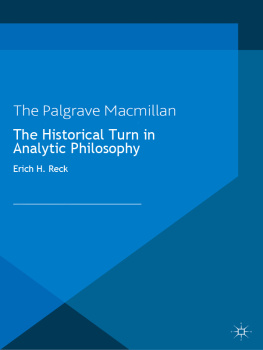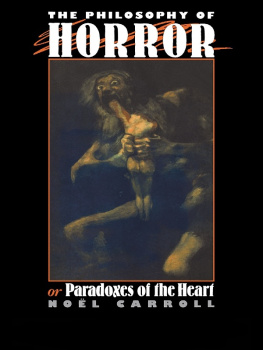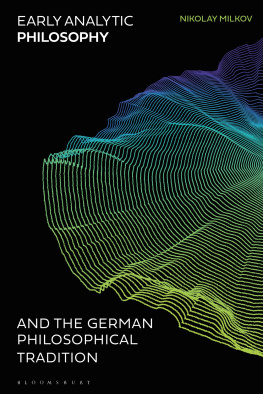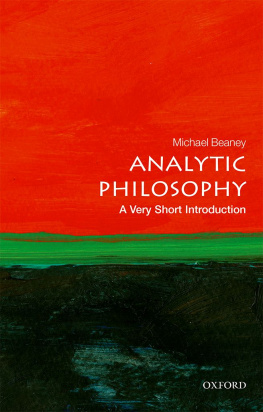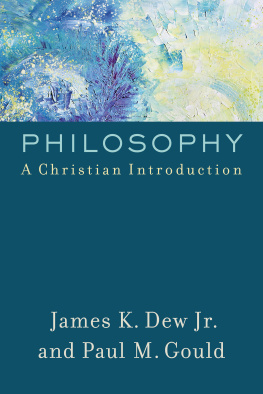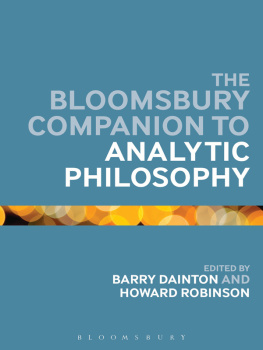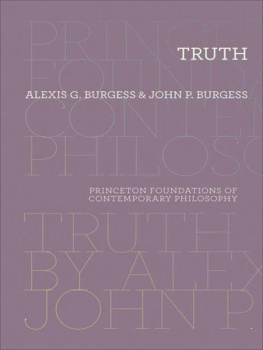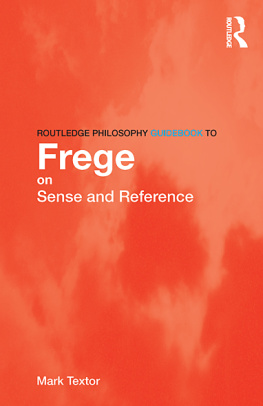AN INTRODUCTION TO
ANALYTIC PHILOSOPHY
PARADOXES, ARGUMENTS AND CONTEMPORARY PROBLEMS
Paul Franceschi
Copyright 2013 Paul Franceschi
All rights reserved.
ISBN: 1482739836
ISBN-13: 978-1482739831
From P. to T.
TABLE OF CONTENTS
ACKNOWLEDGEMENTS
I thank Francis Antona, Christian Carayon and Eric Odin for very useful comments on earlier drafts.
CREDITS
The illustrations were made with Blender software ( http://www.blender.org/ ).
Introduction to the English edition

This book aims to provide an introduction to analytic philosophy. It is primarily intended for readers who want to be initiated into this philosophical style. The approach that I have chosen to offer the reader for that introduction is the same as that by which I myself was introduced to analytic philosophy: the presentation of the most famous problems and paradoxes. An advantage of this approach is that there is no need for any prerequisites. This book aims thus at presenting a significant number of contemporary issues in analytic philosophy. It consists then of illustrating how the approach that is pursued involves the accurate description of problems, clearly identified, and whose presentation does not suffer from ambiguity. The approach adopted throughout this book will therefore consist of the description of a large number of contemporary philosophical problems, thus illustrating the methodology used in analytic philosophy, which consists in describing with precisionoften step by stepa number of problems for which there exists, at present, no consensual solution. It may be useful for this purpose to classify contemporary philosophical problems into three distinct categories: paradoxes, arguments and problems per se . Each of these three types of problem is exposed, in what follows, and usually accompanied by one or more solutions that have been proposed in the contemporary literature.
I will endeavor first to describe a number of paradoxes. The most famous of them are rooted in antiquity and remain still unresolved: the Liar, the sorites paradox, etc. Paradoxes are arguments based on premises and reasoning that seem well-founded, but whose conclusion leads to a contradiction. An excellent definition is provided by Mark Sainsbury, in his book Paradoxes , published in 1995: paradoxes are unacceptable conclusions drawn from seemingly true premises and correct reasoning.
I shall also present a number of arguments that are widely discussed within contemporary philosophical literature. Such arguments are often made up of reasoning whose premises and the deductions that accompany them seem quite acceptable, but whose conclusion proves counter-intuitive. Problems of this type distinguish themselves from the paradoxes in that they do not truly lead to a contradiction. Unlike the paradoxes, we do not observe in this type of argument a contradiction per se , but only a conclusion that proves contrary to common sense. Arguments whose conclusion appears counter-intuitive are close to the paradoxes in the sense that it is very likely that the underlying reasoning is misleading. However, they differ from the paradoxes in the sense that one cannot rule out at the start the possibility that it is our intuition that is at fault. In this case, the solution to the problem posed by this type of argument has to explain why ones conclusion appears at first sight counter-intuitive.
Lastly, I shall describe a number of problems per se that have led to recent discussions in analytic philosophy. Among these problems based on reasoning, some have a very ancient origin, while others have only recently been described.
Analytic philosophy is essentially characterized by a requirement for clarity in the exposition of ideas and a marked concern for rigor at the stage of the argument. Clarity of ideas is intended to avoid ambiguity and difficulties in the interpretation of texts. It also allows a better critical evaluation of the ideas. This necessity for rigor may sometimes require the use of a mathematical formalism, which should not, however, go so far as to require advanced knowledge in mathematics. As we can see, analytic philosophy is primarily a philosophical style.
It is customary to oppose analytic philosophy and continental philosophy. Continental philosophy refers to the philosophical writings of French and German authors of the nineteenth and twentieth centuries, among whom are, without being exhaustive: Friedrich Hegel, Sren Kierkegaard, Friedrich Nietzsche, Karl Marx, Herbert Marcuse, Martin Heidegger, Jean-Paul Sartre, Maurice Merleau-Ponty and Michel Foucault. The writings of these philosophers are characterized by a greater literary involvement and often a stronger political commitment.
Analytic philosophy is sometimes associated with Anglo-Saxon countries and continental philosophy with the European continent. Such a viewpoint is, however, somewhat simplistic. Indeed, it is true that analytic philosophy is currently the dominant style in the United Kingdom, the United States, Canada, Australia and New Zealand, for example. However, it is also represented in France, Italy, Germany, Spain, Portugal, Greece, Belgium, etc. Moreover, if one takes into account ancient and classical philosophers, it is clear that such a viewpoint proves to be incorrect, because one can find a particularly pure analytical style on the banks of the Mediterranean, in the writings of several philosophers of antiquity. The classical Greek philosophers, inventors of famous unresolved paradoxes such as the Liar, the sorites paradox, but also the paradoxes of Zeno of Elea, constitute outstanding examples. With Plato in particular, one can also find the clarity of the argument in the famous Allegory of the cave.
Moreover, one will find in Pascal, with the Wager argument, all the criteria of a detailed, accurate and clear argumentation. And most importantly, we can notice that Descartes was practicing an astonishingly pure and avant-gardist analytical style. Many of the arguments of Descartes could have been included without change in the contemporary analytic philosophical literature. In the present work, one will thus find the famous cogito argument, the evil demon argument, the ontological argument of Descartes, as well as an argument in favor of mind/body dualism.
It would be rather awkward and Manichean to oppose the two stylesanalytical and continentalby considering that one is better than the other. So less overtly subjectively, we can estimate that these are two different styles of practicing philosophy, which each have their own advantages and disadvantages. It is certainly necessary to preserve both styles, given their respective merits and complementarity. Finally, it turns out that the coexistence of the two styles essentially constitutes an expression of cultural diversity that proves to be synonymous with wealth.
The Liar Paradox

The Liar paradox is one of the oldest and deepest of the known paradoxes. It is attributed to the Greek philosopher Eubulides of Miletus, who lived in the fourth century BC. The Liar paradox can be expressed very simply, since it arises directly from the consideration of the following statement: This sentence is false. The paradox stems from the fact that if this last sentence is true , then it follows that it is false, but if the sentence is false , then it is false that it is false and therefore it is true. Thus This sentence is false is false if it is true, and true if it is false. In conclusion, This sentence is false is true if and only if it is false, and the latter conclusion turns out to be paradoxical.


